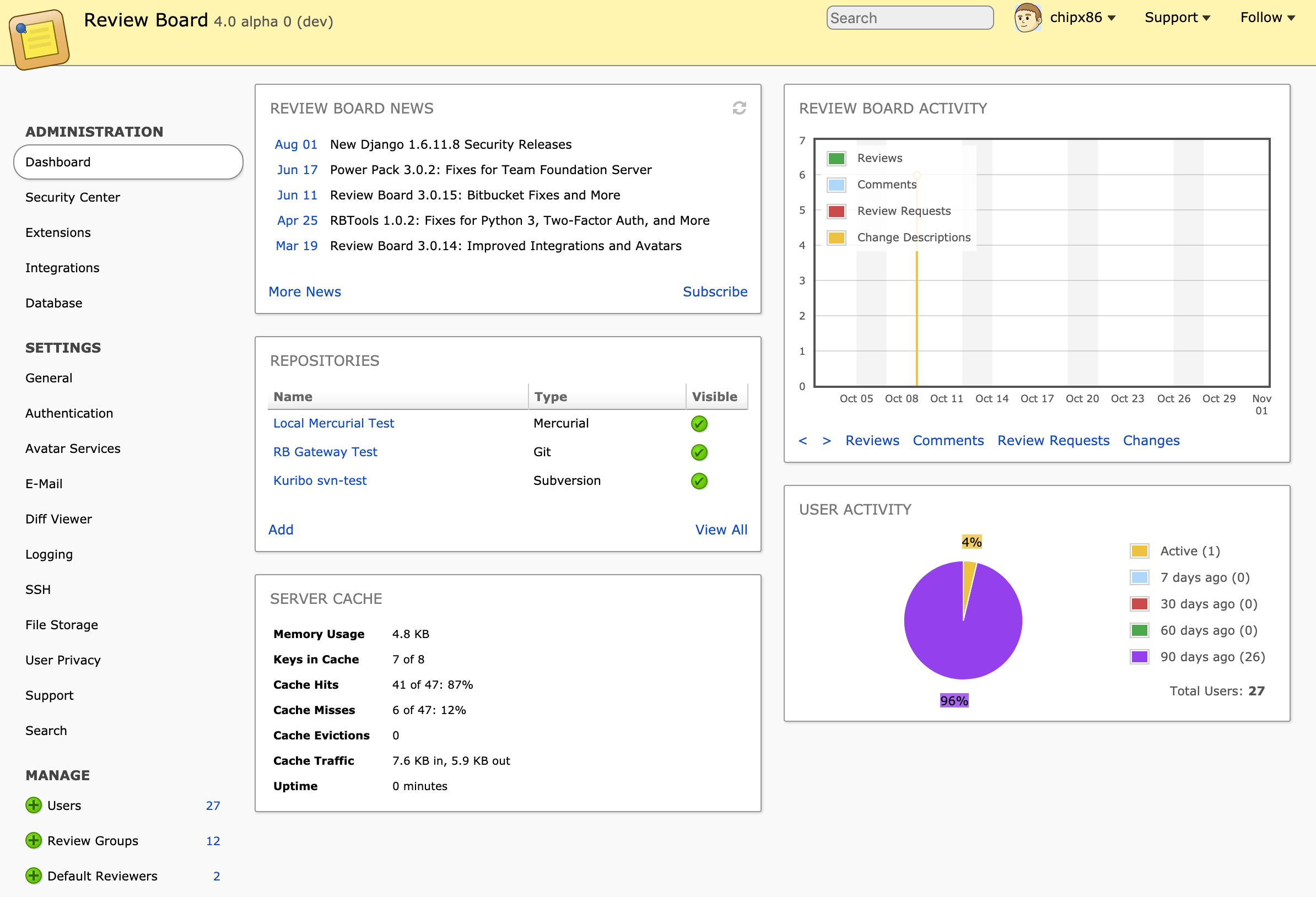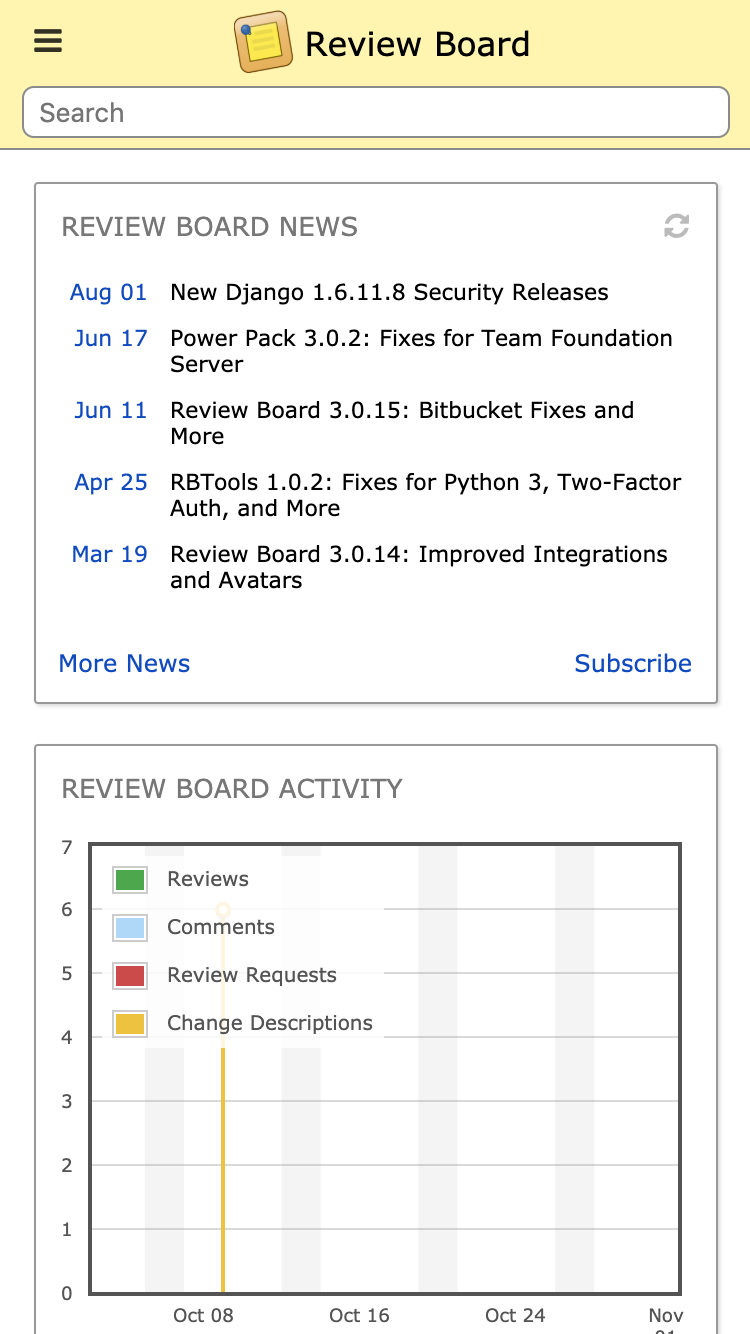This week in ChangeLog, let’s talk about three projects we’ve been working on this week:
- Multi-repository diffs
- The latest administration UI improvements
- Billing improvements and user roles in RBCommons
Multi-Repository Diffs
It’s pretty common to work with a lot of repositories at the same time, linking them together using Git submodules, SVN externals, or some other method. Sometimes you need to make changes across many repositories at once, and it’d be helpful to post those changes as one review request.
The problem is that diffs made across repositories aren’t always so useful. Not only do they generally lack repository information for each file, but Review Board itself assumes a single repository per review request. This matters because in order to show the diff viewer, Review Board needs to load each source file from the repository before it can apply the diff.
We’re trying to work toward multi-repository diff support as part of Review Board 4.0. Our existing DVCS work got us part-way there. The remaining pieces are/were:
- Updating our diff parsers to allow additional information (such as repository details) to be extracted and stored
- Updated our
FileDiffmodel (representing a parsed file from a diff) to link to aRepository, and updating code to use that instead ofReviewRequest.repository - Getting this information into diffs
Step 1 is done as of this week, and step 2 is mostly done. Step 3 is where things get interesting.
We talked last week about DiffX, our initiative to make diffs better. We’re hoping to start using DiffX from within RBTools and to inject repository information into the diff.
This is a longer-term goal, though. We’re exploring some options shorter-term, and talking to one vendor about natively providing this information in diffs they generate.
So will this be usable in Review Board 4.0? Kind of. We should have the core functionality all done, but not much may take advantage of this at first. Long-term, we’ll introduce multi-repository diff support for more types of repositories, and it’ll be amazing.
Administration UI Updates
Another week, another batch of screenshots to share of the new administration UI. We’ve completed the main database page and the Change List page, which lists all changes made to the database for a specific type of model (table).
These build upon new CSS components coming to 4.0, which offer slide-out action drawers and filters for datagrids, inline warning/error/info alerts, and more goodies that extension authors can use for their own projects.
Next up are the Settings and Change Form pages, which allow for making changes to models in the database.
Once these are done, we get to upgrade Django!
RBCommons Roles and Billing Updates
RBCommons, our Review Board SaaS, has received a lot of our attention lately. Particularly in the areas of billing, team administration, and sign-up.
Much of this work is based on customer feedback. As RBCommons has grown, our user base has moved from primarily Silicon Valley startups to an international community of companies, organizations, and educational institutions of all sizes. And some of those need a bit more from us when it comes to how they manage their teams and handle billing-related matters.
As part of our plans, we’re working on:
- Splitting the existing Team Administrator role into three new roles:
- Team Owner (capable of making all changes to an account, including cancelling and changing plans)
- Team Administrator (capable of managing users, repositories, review groups, etc., but cannot manage anything billing-related)
- Billing Contact (can view invoices, change payment information, and receive billing-related e-mails, but nothing else)
- Improving our invoices, showing more useful information to help users better meet any company-internal, regulatory, or tax requirements they might have
- Adapting our billing process to work better with credit card billing changes that are or will be going into effect in some countries, to ensure these customers’ payments go through without any headaches
- Improving the sign-up flow, to help get teams up-and-running a bit faster
We’ll talk about all this in more detail later when we launch our next big update to RBCommons.
Next Week
We’ll have more Administration UI work to show off, and with it a new collection of CSS Components to talk about. We’ll also go over what our CANOSP students from the University of Alberta have been up to.
If you have any questions, or anything you’re curious about and want us to cover, please reach out on our community forum.
We’re also on reddit /r/reviewboard, Twitter, and Facebook, if you want other ways to keep up with the latest.




